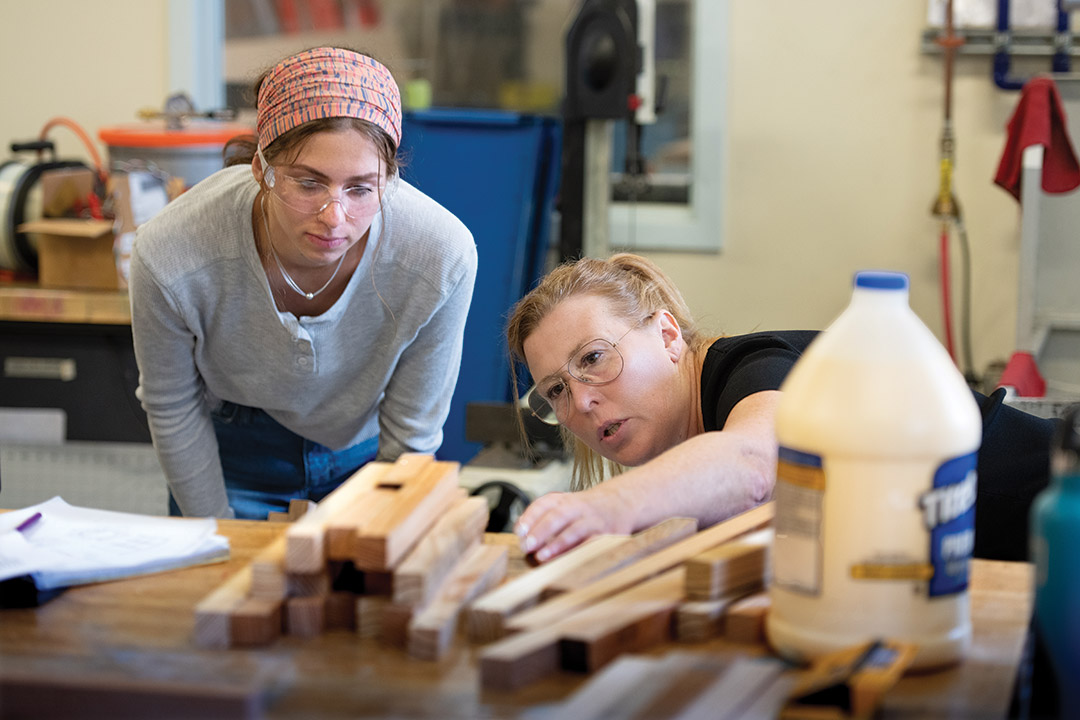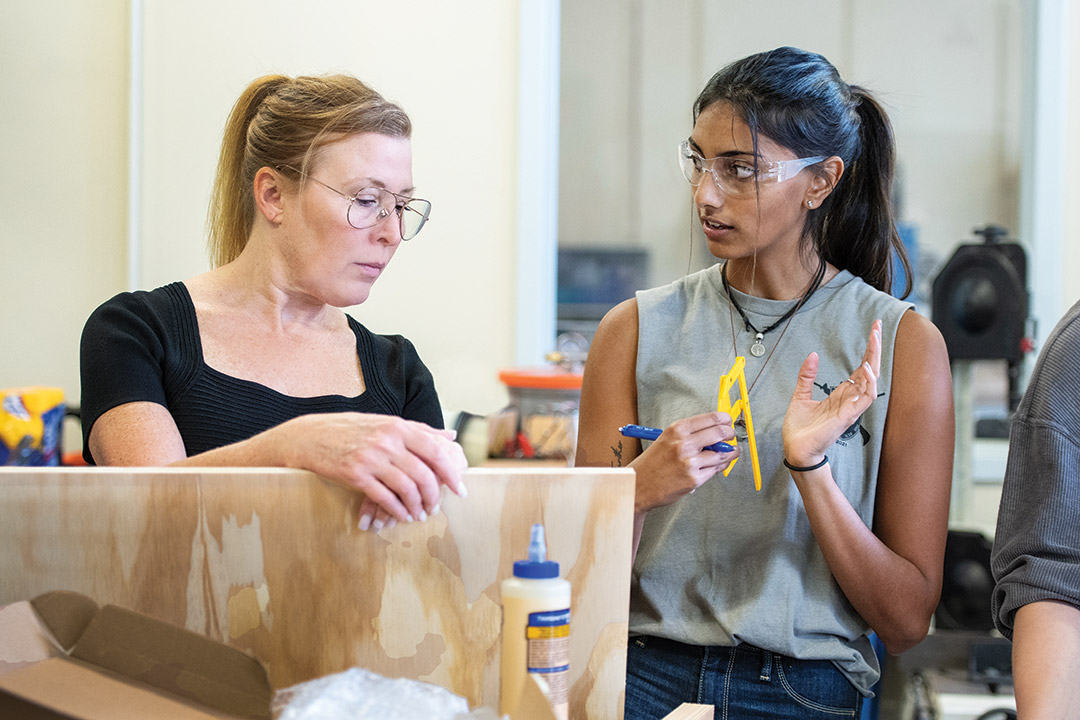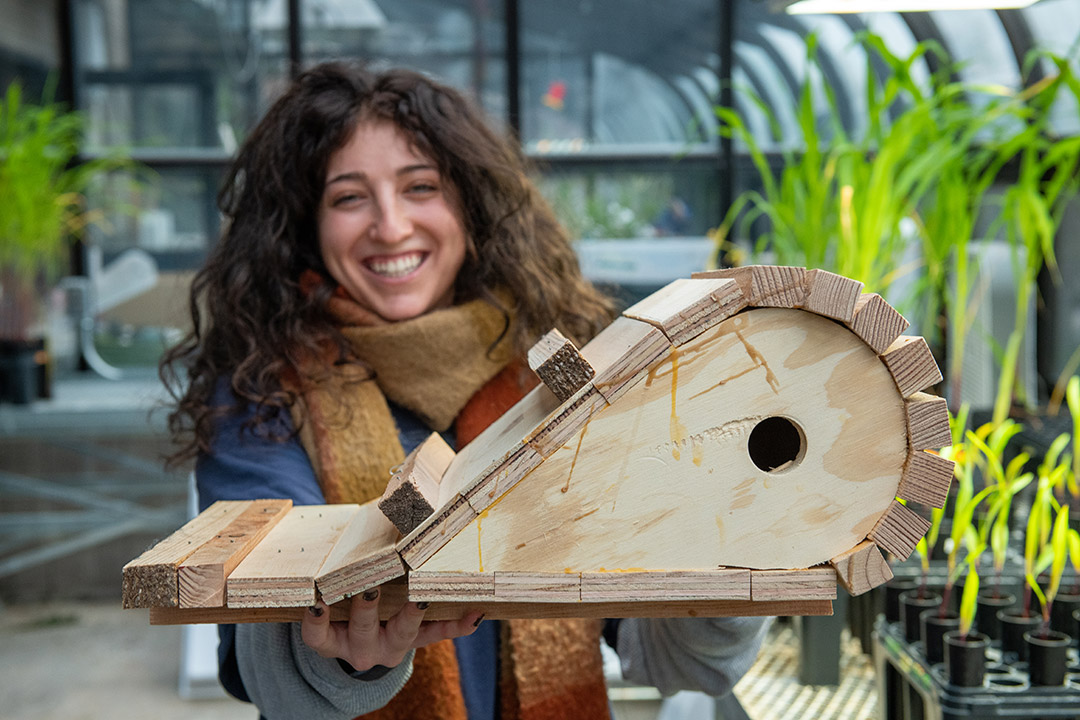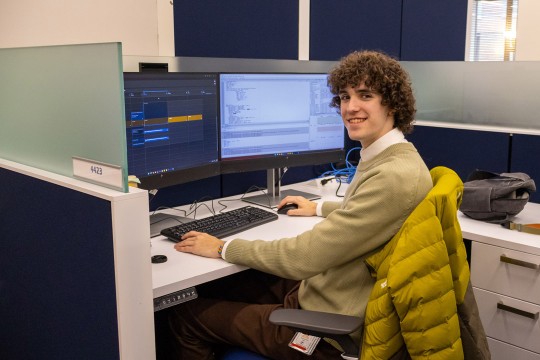Students lean into technology and design to improve the environment
Carlos Ortiz
Students worked with instructors to finalize their birdhouse designs before diving into construction.
After drafting and reviewing their original designs, students began working on their latest project. With wood and hardware in hand, each student took a unique approach to building a birdhouse to help promote and protect the bird populations on campus.
Carlos Ortiz
Instructors prompted students to think critically about both design aesthetic and practical use of the final product.
Natalie Siwek, an environmental science student from Shrewsbury, Mass., shared that giving back to the environment she has grown to love over her four years at RIT is gratifying.
“It’s rewarding to know that I’m not just doing the work for a grade. A lot of the spaces we’ve been working with mean a lot to me. I have a lot of memories associated with them,” said Siwek. “And picking a space on campus we wanted to improve for our final project was really exciting for me.”
Building species-targeted birdhouses is one of the many hands-on projects Siwek and her class completed during the fall as part of a new course called Campus Ecology, currently offered by RIT’s College of Science.
Described as an active learning course, students in the course explored how culture, art, science, and design influence their views and understandings of nature. They also discussed how interdisciplinary collaboration and leaning into the intersection of technology, the arts, and design could improve communication and understanding of ecological concepts and sustainability goals.
Carlos Ortiz
Described as an active learning course, students in the course explored how culture, art, science, and design influence their views and understandings of nature.
To ensure students could benefit from a truly interdisciplinary experience, Professor Karl Korfmacher connected with scholars from across the university to prepare a new curriculum and co-teach the course.
“When I was a student, I loved the interdisciplinary classes that blended a lot of different fields,” said Korfmacher. “I’ve been looking to create a course like this for quite some time and, thankfully, there’s enough like-minded people on this team who have that same kind of vision.”
There is a total of eight faculty and staff members leading the course. Korfmacher, Principal Lecturer Dawn Carter, Professor Elizabeth Hane, and Associate Professor Susan Pagano represent RIT’s College of Science. Principal Lecturer Emily Glass and Associate Professor Mary Golden represent RIT’s College of Art and Design. Senior Lecturer Sarah Brownell represents Kate Gleason College of Engineering, and Senior Advisor to the President for Strategic Planning and Sustainability Enid Cardinal serves as liaison to the Office of the President.
Siwek shared that learning from such a diverse array of experts was a big selling point for the course.
“I think it has helped me become more of a critical thinker. I tend to resort more to stuff I’ve seen before, stuff that’s been shown by science to work,” said Siwek. “But by getting the different perspectives from my professors and classmates, I was able to expand my idea of what is actually possible.”
Hands-on projects are a heavy component of the course, and students also take interactive field trips to further explore the campus environment. Emma Avratin, a fourth-year School of Individualized Study student, said she enjoyed working outside of the classroom and leaving a tangible impact on the campus landscape.
“I think the best learning happens when we can really be hands-on. We can prepare in the classroom as much as we’d like, but unless you’re out there doing the work, you never truly know how to approach certain situations or what it really takes to solve a problem,” said Avratin, from Sharon, Mass.
Avratin also emphasized the value of having a plethora of different minds working together in one classroom.
“In life, we’re not going to only work with one area or one field of study. We need people who are solving multi-level problems, so combining multiple perspectives is what we need to focus on. That’s what our future needs,” said Avratin.
Campus Ecology is currently offered as a College of Science Special Topics course, but Korfmacher shared that the goal is to offer it as a cross-listed course with the Kate Gleason College and College of Art and Design.
Due to the interdisciplinary nature of the course, once cross-listed, Campus Ecology is envisioned for approval as either an Artistic or a Scientific Principles general education perspectives course.














